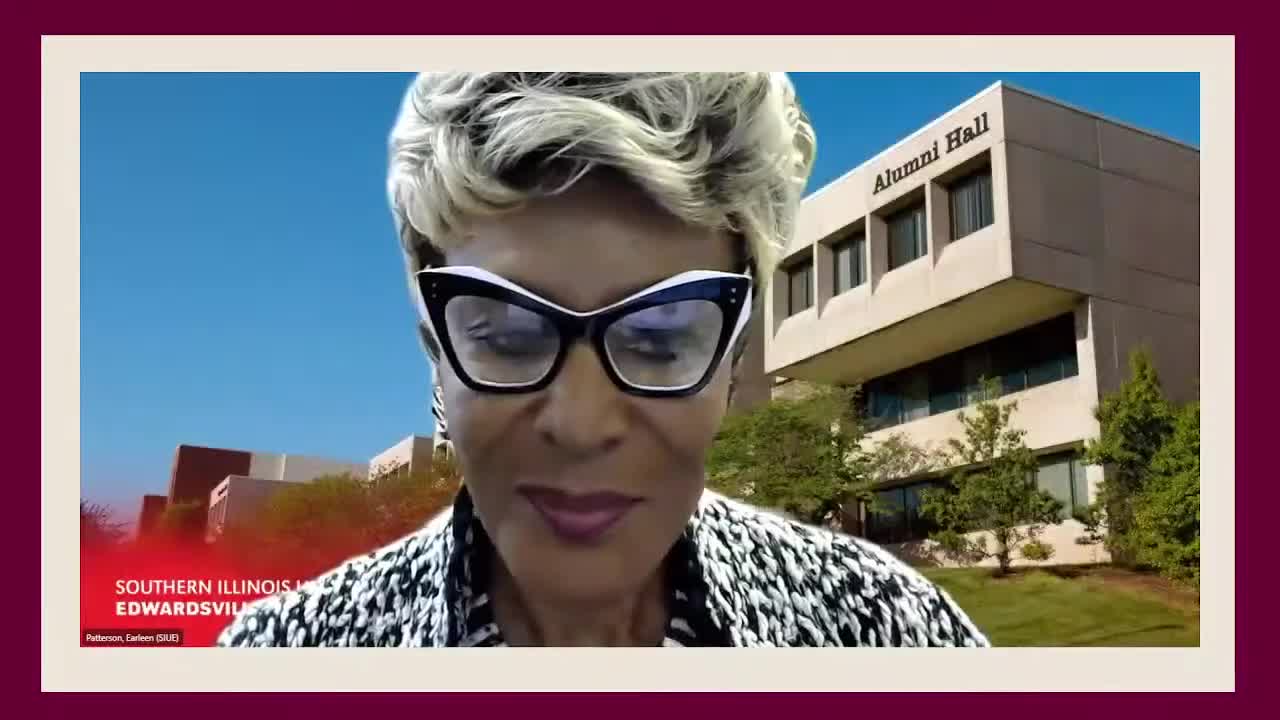SIU panel urges ‘culture of care,’ expanded advising to boost retention
Get AI-powered insights, summaries, and transcripts
Subscribe
Summary
A Southern Illinois University System panel of award-winning advisors and administrators described a ‘culture of care’—personalized advising, early-warning systems and peer mentoring—as central to student persistence and highlighted SIUE programs that narrowed retention gaps.
Southern Illinois University System leaders and longtime student-success professionals on Friday framed a “culture of care” — centered on personalized advising, early intervention and peer support — as the best way to keep historically underserved students enrolled and progressing toward degrees.
Dr. Sheila Caldwell, vice president for Anti-Racism, Diversity, Equity and Inclusion for the Southern Illinois University System, opened the recorded panel and said the conversation would focus on “student success, fostering a culture of care, and ensuring that every student has the opportunity to thrive across SIU campuses.”
The panelists stressed that the first step in building a culture of care is asking students about their lived circumstances rather than making assumptions. “Stop and listen and think about it before you ever say, ‘well, I’ve got an answer for you,’ because I don’t even know what your questions are,” said Father Joseph Brown, the inaugural 2023 ADEI Lifetime Achievement Award winner for the SIU Carbondale campus, who urged advisers to “teach the students in front of you, not the ones you went to school with.”
Why it matters: Panelists linked a care-centered approach to measurable retention gains. Dr. Earline Patterson, associate vice chancellor for equity, diversity and inclusion at Southern Illinois University Edwardsville (SIUE), described a portfolio of programs — including the Boundless Scholar Experience (BSE), summer success programs, an expanded success-coach team and an early-warning system — that she said helped SIUE close its institutional equity gap for first-year retention. Patterson said first-year retention for Black and white students at SIUE is now about 81 percent.
Key practices panelists described include proactive outreach, hard-scheduled advising appointments, intrusive supports for students on academic probation and peer mentoring. Dr. Randy Burnside, director of MedPrep at the SIU School of Medicine, summarized the approach with an acronym he uses for advising: “engage, nurture, respect, inspire, celebrate and hold accountable,” and highlighted the importance of psychological safety so students feel seen and able to ask for help.
Panelists pointed to specific program models. Patterson said the Boundless Scholar Experience began as two small sections (about 25 students each) focused on African American literature and pedagogy; after data showed strong persistence outcomes, SIUE expanded the program to 14 sections with classes that can enroll 40–50 students. The expansion, she said, scaled an evidence-based model that connects students to resources and community partners and includes scholarships targeted to Pell-eligible participants.
Barriers and policy suggestions: Panelists identified obstacles that limit advising effectiveness. Brown said many advisers’ workloads are too high for relationship-based advising: “If one adviser has 50 or 60 students, somebody’s gonna be missing an awful lot of information.” Patterson emphasized three limits on advisers’ impact: poor visibility into student progress during the term, lack of alignment across departments and low student engagement. She said campus early-warning systems — where faculty report early signs of struggle — are essential to reach vulnerable students who might otherwise fall through the cracks.
On institutional policy, Burnside recommended avoiding one-size-fits-all messaging such as a strict “finish in four years” expectation for all students, noting it can be counterproductive for students who need more time. Panelists also urged expanding advisor training (including culturally responsive advising), hiring to reduce caseloads, giving advisers a seat at decision-making tables and strengthening pedagogy training for faculty and graduate instructors.
What they recommended next: The panel called for investment in programs with demonstrated results and for systemwide use of early data to scale successful interventions. Patterson and others urged more faculty participation in early-warning systems and suggested parenting and family engagement components for first-generation students. Brown proposed that doctoral programs require basic pedagogy training for future faculty to reduce the lag between hiring and effective teaching.
The panel did not take formal votes or adopt policy; it was a recorded professional-development conversation intended to share strategies and examples across SIU campuses.
The discussion was recorded for SIU System professional development and will be shared online; the panel encouraged viewers to submit questions in the chat for a brief Q&A segment at the end of the session.
